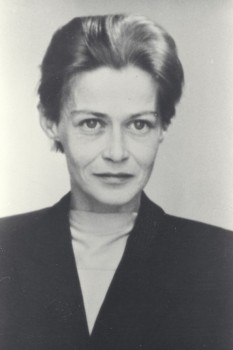Search results for "joel lehtonen"
When sleeping dogs wake
31 December 1994 | Archives online, Fiction, Prose
Extracts rom the novel Tuomari Müller, hieno mies (‘Judge Müller, a fine man’, WSOY, 1994). Introduction by Soila Lehtonen
In due course the door to the flat was opened, and a stoutish, quiet-looking woman admitted the three men, showed them where to hang their coats, indicated an open door straight ahead of them, and herself disappeared through another door.
After briefly elbowing each other in front of the mirror, the visitors took a deep breath and entered the room. The gardener was the last to go in. The home help, or whatever she was, brought in a pot of coffee and placed it on a tray, on which cups had already been set out, within reach of her mistress. The widow herself remained seated. They shook hands with her in tum. The mayor was greeted with a smile, but the bank manager and the gardener were not expected, and their presence came as a shock. She pulled herself together and invited the gentlemen to seat themselves, side by side, facing her across the table. They heard the front door slam shut: presumably the home help had gone out. More…
In pursuit of a conscience
19 March 2012 | Drama, Fiction
‘An unflinching opera and a hot-blooded cantata about a time when the church was torn apart, Finland was divided and gays stopped being biddable’: this is how Pirkko Saisio’s new play HOMO! (music composed by Jussi Tuurna) is described by the Finnish National Theatre, where it is currently playing to full houses. This tragicomical-farcical satire takes up serious issues with gusto. In this extract we meet Veijo Teräs, troubled by his dreams of Snow White, who resembles his steely MP wife Hellevi – and seven dwarves. Introduction by Soila Lehtonen

Dictators and bishops: Scene 15, ‘A small international gay opera’. Photographs: The Finnish National Theatre / Laura Malmivaara, 2011
CAST OF CHARACTERS
Veijo Teräs
Hellevi, Veijo’s wife and a Member of Parliament
Hellevi’s Conscience
Rebekka, Hellevi and Veijo’s daughter
Moritz, Hellevi and Veijo’s godson
Agnes af Starck-Hare, Doctor of Psychiatry
Seven Dwarves
Tom of Finland
Atik
The Bishop of Mikkeli
Adolf Hitler
Albert Speer
Josef Stalin
Old gays: Kale, Jorma, Rekku, Risto
Olli, Uffe,Tiina, Jorma: people from SETA [the Finnish LGBT association]
Second Lieutenant, Private Teräs, the men in the company
A Policeman
Big Gay, Little Gay, Middle Gay
William Shakespeare
Hermann Göring
Hans-Christian Andersen
Teemu & Oskari, a gay couple
The Apostle Paul
Father Nitro
Winston Churchill
SCENE ONE
On the stage, a narrow closet.
Veijo Teräs appears, struggling to get out of the closet.
Veijo Teräs is dressed as a prince. He is surprised and embarrassed to see that the audience is already there. He seems to be waiting for something.
He speaks, but continues to look out over the audience expectantly.
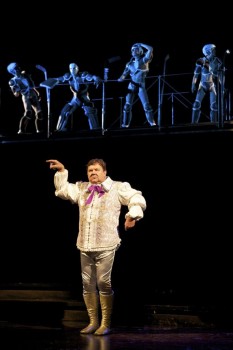
Snow White's spouse, Veijo (Juha Muje), and the dwarves. Photo: Laura Malmivaara, 2011
VEIJO
This outfit isn’t specifically for me, because… I mean, it’s part of this whole thing. This Snow White thing. I’m waiting for the play to start. Just like you are. My name is Veijo Teräs and I’m playing the point of view role in this story. Writers put point of view roles like this in their plays nowadays. They didn’t use to.
Just to be clear – this isn’t a ballet costume. I’m not going to do any ballet dancing, but I won’t mind if someone dances, even if it’s a man. Particularly if it’s a man. But I don’t watch. Ballet, I mean. Not at the opera house, or on television, or anywhere, and I have no idea why we had to bring up ballet – or I had to bring it up – because this is a historical costume, so it’s appropriate. This is what men used to wear, real men like Romeo and Hamlet, or Cyrano de Bergerac. But we in the theatre these days have a hell of a job getting an audience to listen to what a man has to say when he’s standing there saying what he has to say in an outfit like this. People get the idea that it’s a humorous thing, but this isn’t, this Snow White thing, where I play the prince. Snow White is waiting in her glass casket, she died from an apple, which seems to have become the Apple logo, Lord knows why, the one on the laptops you see on the tables of every café in town. More…
A soul on the train
In one of Heli Laaksonen’s poems the narrator buys a ticket for her soul and herself in a train’s pet carriage. Her capricious poetry features new potatoes, woodpeckers, weasels, and even a pig in fox’s clothing. Introduction by Mervi Kantokorpi
Poems from Peippo vei (‘The chaffinch took it’, Otava, 2011)
First early
From the potato patch there rose a human seedling, too.
Winston, I called it
as it was Winstons I’d sowed in this row
Whole,
beautiful,
unmarked by hoe or blight.
I put it in the basket with the others.
It sat there in the quiet pile, at the edge,
looked on while I slogged away,
gnawing a little bit out of the side of a potato.
What was it thinking?
What could it be that earlies think about?
The first summer sparrows are fresh out of the oven.
I so wish they’d only think about nice things.
I try to look happy
to give them a good start. More…
The magic box: childhood revisited
25 December 2014 | Essays, Non-fiction
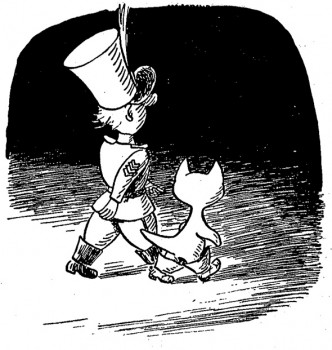
The tin soldier and the Blue Cat. Illustration: Usko Laukkanen
A tribute to Oiva Paloheimo’s children’s novel Tinaseppä ja seitsemän (‘The Tinsmith and the Seven’, illustrated by Usko Laukkanen, WSOY, 1956)
I’ve happened upon this (Christmassy) text of mine – first published in Books from Finland back in 1995 – when sorting through my papers as I begin to contemplate my retirement. With it I would like to offer my goodbyes, and many thanks, to you – to our readers, for whom I have been commissioning, editing and writing texts for the past thirty-one years – it’s time to do other things; time to read the books that still remain unread…
A dusky winter’s afternoon. Outside, soft and grey, a little snow is falling. I am sitting in our living-room, in an armchair covered in a pale yellow boucle fabric, my legs curled up, eating a carrot. In my lap is a book which I have fetched from the library after school. Conversation, the faint clattering of crockery, a singing kettle, the smell of food: grandmother and mother are cooking supper in the kitchen. My little sister is asleep.
But these sounds and the room around me do not really exist: there is only the world of make-believe in which Tiina sets off on her adventures with the Blue Cat, the Tinsmith, the St Bernard dog, the star and the spider: that world is a magic box which is able to contain all of childhood. More…
Dog days
30 September 2008 | Fiction, Prose
A story from Avantgarderob ja muuta irtaimistoa (‘Avantgarderobe and other moveables’, Tammi, 2008). Introduction by Soila Lehtonen
The air between the old dog’s teeth cuts like a crosscut saw.
There is a furious rhythm in her bark.
She’s been left out of the moose-hunting pack.
The more decrepit her body is, the stiffer her joints, the more her bark is filled with passion for the hunt. But she shows no sign of nostalgia, she’s not hankering after some long-ago days of glory, when she was the leader of the pack. This is clearly a bark of command. Even from kilometres away, she tells the other dogs where to go — not that way — a little more to the left — behind that stump, you blockheads! More…
Portraits and bagatelles
30 September 2008 | Fiction, Prose

Kaarina Valoaalto. Photo: Tammi.
Soila Lehtonen on Kaarina Valoaalto’s new collection of short prose
In Kaarina Valoaalto’s prose ‘the river, made wild by a storm, gallops, foaming at the mouth, down between the stays of the street banks and into the sea’ and ‘the fly is a classic’: ‘its buzz sounds the cycle of the year and all of the scales of feeling. A fly brings together agrarian and urban culture…. When I hear it, I believe I’m alone in the cabin of a sailboat, anchored to the bottom of a bay where terns and seagulls call out on the gleaming blue of the open sea and no there is no coffee because no one has bothered to make it’. More…
Perfect thing
31 December 2000 | Archives online, Fiction, Prose
Extracts from the novel Ennen päivänlaskua ei voi (‘Not before sundown’, Tammi, 2000). Interview and introduction by Soila Lehtonen
A youngster is asleep on the asphalt in the backyard, near the dustbins. In the dark I can only make out a black shape among the shadows.
I creep closer and reach out my hand. The figure clearly hears me coming, weakly raises its head from the crouching position for a moment, opens its eyes, and I can finally make out what it is.
It’s the most beautiful thing I’ve ever seen.
I know straight away that I want it. More…
New from the archive
11 June 2015 | This 'n' that
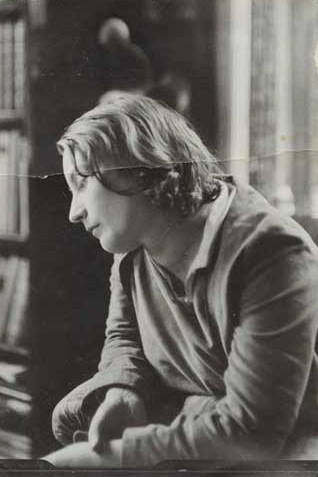
Helvi Hämäläinen. Photo: Literary Archives of the Finnish Literature Society.
This week, an excerpt from Helvi Hämäläinen’s gorgeously sensuous novel Säädyllinen murhenäytelmä (‘A respectable tragedy’,1941)
Right at the top of the list of untranslated Finnish masterpieces, for me, is Helvi Hämäläinen’s monumental Säädyllinen murhenäytelmä.
Written in the fateful summer of 1939, as the world waited for war, this story of love among the Helsinki intelligentsia is at the same time both a roman a clef – it caused a sensation on publication as the real people behind the fictional characters were recognised – and a vivid picture of its age. The falling cadences of its luxuriantly proliferating phrases offer a voluptuously aesthetic poetry of the senses as they slowly tell the story of love lost and then, gradually, regained. And the book answers the question, what was it like to be alive then?, with incomparable vividness. In this extract, the novelty of apartment living in the 1930s, the colours and smells, the new social habits, are all brought to life with extraordinary intensity.
We also republish a selection of poems published much later in Hämäläinen’s life, many of them impassioned elegies for the lives lost in the Second World War, giving voice to the sheer weight of sorrow, of grief for those who were lost.
If you’d like to read more, Soila Lehtonen’s evocative essay on Säädyllinen murhenäytelmä accompanies another excerpt; while a glimpse of its sequel, Kadotettu puutarha, (‘The lost garden’, 1995), follows the story onward to an elegiac description of the parts of Karelia that were ceded to the Soviet Union in the Second World War.
![]()
The Books from Finland digitisation project continues, with a total of 396 articles and book excerpts made available on our website so far. Each week, we bring a newly digitised text to your attention.
Dracula fights for Finland
16 June 2015 | This 'n' that
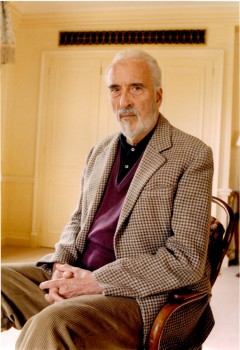
Christopher Lee. Photo: Devlin crow / CC BY-SA 3.0
Actor Christopher Lee loved Finland and knew the Kalevala
Among the obituaries of Christopher Lee, the celebrated actor who died last week at the age of 93, one fact has remained strangely overlooked: his connection with Finland.
Lee (born 1922) specialised in monsters and villains; his most famous roles included Dracula, the Mummy, Frankenstein’s monster, Count Dooku in Star Wars and the wizard Saruman in The Lord of the Rings.
Writing in the Helsingin Sanomat newspaper, Veli-Pekka Lehtonen reveals that Lee knew Finland well. As a very young man he had volunteered for service in the Winter War of 1939; the British soldiers’ skiing skills, however, made them less than useful and they were sent home.
Lee also had an extensive knowledge of the architecture of Helsinki, and loved the Finnish national epic, the Kalevala.
That love came full circle in his role in The Lord of the Rings. J.R.R. Tolkien, the trilogy’s author, was also a Kalevala fan – the inspiration for his work on the kingdom of Middle Earth lay in the Kalevala’s story of Kullervo. As he wrote to his friend, the poet W.H. Auden, in 1955, ‘the beginning of the legendarium… was an attempt to reorganise some of the Kalevala, especially the tale of Kullervo the hapless, into a form of my own.’
Tolkien, a professional philologist, particularly loved the Finnish language. He described finding a Finnish grammar book as being like ‘entering a completely new wine-cellar filled with bottles for an amazing wine of a kind a flavour never tasted before.’
Christopher Lee may not have known Finnish, but he had clearly sampled the same wine.

